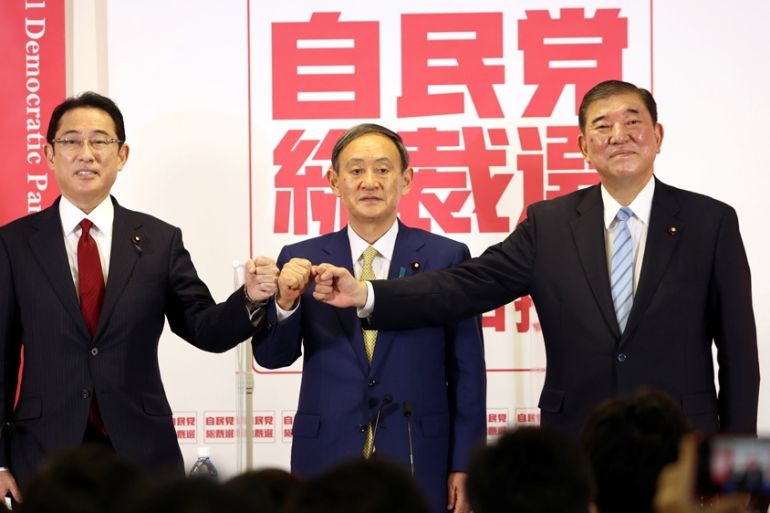Japan governing party LDP launches race for Abe’s successor
Frontrunner is 71-year-old Chief Cabinet Secretary Yoshihide Suga who says tackling the coronavirus will be a priority.

Japan’s governing party on Tuesday kicked off the race to pick Prime Minister Shinzo Abe’s successor, with his powerful right-hand man Yoshihide Suga commanding an all-but-insurmountable lead.
Chief Cabinet Secretary Suga, the 71-year-old son of a strawberry farmer, has already secured the support of significant factions in the Liberal Democratic Party ahead of its leadership vote on September 14.
But he is not running unchallenged, with a popular former defence minister and the party’s policy chief standing against him.
With the LDP commanding a solid legislative majority, whoever wins the contest is certain to win a parliamentary vote on September 16 and be named the country’s next prime minister.
The LDP race began after Abe, modern Japan’s longest-serving prime minister, announced in late August that he was resigning because of ill health.
There is also speculation that the new leader may also call a snap election to shore up public support.
On Tuesday morning, representatives for Suga and his rivals – former defence minister Shigeru Ishiba and party policy chief Fumio Kishida – formally registered their candidacies.
At a public address later, Suga said he would make fighting the coronavirus his priority and would continue with Abe’s economic strategy, known as Abenomics.
|
|
The contenders will also take part in two public debates, although the vote itself will include only LDP politicians and three party representatives from each of Japan’s 47 regions. A broader vote including rank-and-file party members was ruled out, with officials saying it would take too long to organise.
Whoever takes the top office will face multiple challenges – from the coronavirus and the associated collapse in the economy to ensuring the postponed Tokyo Olympic Games will go ahead next year.
Powerful enforcer
Ishiba and Kishida have both spoken of the need to ensure that stimulus unleashed following the coronavirus crisis targets those most in need.
Former banker Ishiba, 63, is popular with the electorate and consistently topped polls before Abe’s resignation.
A defence policy wonk, he supports strengthening the role of the country’s Self-Defense Forces in the pacifist constitution.
But he is still regarded with suspicion by some in the LDP because he left the party for a time, serving as an independent and then with a rival party, before returning.
Kishida, also 63, was long viewed as Abe’s heir apparent and considered the prime minister’s favoured successor.
But he appeared to fall from grace more recently, with his proposal for targeted stimulus being cast aside in favour of money for all residents, and Abe has declined to publicly support any one candidate.
Suga had until recently denied any ambition for the top job but said he decided to run to continue Abe’s programmes, especially economic measures.

He put himself through night college by working odd jobs before winning a Yokohama city council seat, and has served as Abe’s closest adviser and a powerful enforcer of government policy.
Suga is seen as able to bend Japan’s vast and sometimes intransigent bureaucracy to the government’s will, but has come under fire for his dealing with journalists, with critics accusing him of dodging questions.
Abe rose to power by touting conservative policies including amending the constitution.
But what is known of Suga’s policy interests tends towards the practical rather than the ideological, including speeding up digitalisation of government agencies, cutting the cost of mobile services and increasing foreign tourism.